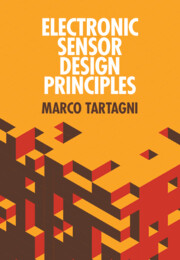Book contents
- Electronic Sensor Design Principles
- Electronic Sensor Design Principles
- Copyright page
- Dedication
- Contents
- Preface
- Part I Fundamentals
- Part II Noise and Electronic Interfaces
- 6 The Origin of Noise
- 7 Noise in Electronic Devices and Circuits
- 8 Detection Techniques
- Part III Selected Topics on Physics of Transduction
- Part IV Problems and Solutions
- Index
- References
8 - Detection Techniques
from Part II - Noise and Electronic Interfaces
Published online by Cambridge University Press: 23 December 2021
- Electronic Sensor Design Principles
- Electronic Sensor Design Principles
- Copyright page
- Dedication
- Contents
- Preface
- Part I Fundamentals
- Part II Noise and Electronic Interfaces
- 6 The Origin of Noise
- 7 Noise in Electronic Devices and Circuits
- 8 Detection Techniques
- Part III Selected Topics on Physics of Transduction
- Part IV Problems and Solutions
- Index
- References
Summary
The noise performance and the main characteristics of electronics devices and elementary building blocks have been discussed in earlier chapters. Here, more complex techniques for sensing interfaces are presented. Architectures tailored for specific cases such as resistive and capacitive sensing are analyzed. Furthermore, modulation, feedback, and time-to-digital techniques for signal detection are shown.
Keywords
Information
- Type
- Chapter
- Information
- Electronic Sensor Design Principles , pp. 374 - 422Publisher: Cambridge University PressPrint publication year: 2022
